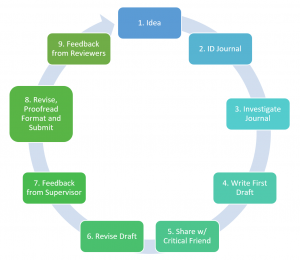21 An Overview of the Submission Process
Feedback and The Submission Cycle
One way of thinking about the process of writing for publication is as part of a cycle: your earliest seeds of an idea give rise to a new project, to be developed, written up and later revised; whether or not your paper is accepted, the feedback you receive along the way helps give rise to the development of new ideas to explore.

Feedback is crucial in the process of revising and submitting your work. After writing your first draft, after revising your paper, and after initially submitting your paper, build in time to revise and edit your work. Although learning to revise and edit your own work is an important skill for a graduate student to hone, this process can be often be most effective in response to feedback from other readers.
One crucial, early source of this feedback can come from what Arthur L. Costa and Bena Kallick describe as a “critical friend” (1993). Characterized by trust and reciprocity, a critical friendship offers both parties an opportunity to improve their own work by sharing outside perspectives on one another’s projects. Critical friendships, framed in the context of a writing partnership, can be one useful way to foster accountability in terms of meeting your own writing goals; collaborators and colleagues in your department or in a related field at a similar stage of training can make excellent critical friends and first readers.
Your supervisor can also be a valuable source of insight and feedback around how to improve your work. Before asking your supervisor – or anyone – for feedback on your written work, consider what type of commentary you think would be most useful. Are you looking for structural feedback related to the flow of how you have scaffolded your ideas? For their perspective on the clarity or coherence of a particular inference or argument you are making? For insight into which journals or publications in your field might be most interested in your work? Communicating what type of feedback you feel would be most helpful – as well as any timelines you are working with – can help make this process smoother for both of you.
Finally, when you submit your paper for publication, anticipate that you will receive feedback from reviewers and editors that may be useful in further honing your work. More advice about implementing and responding to these comments is linked here [INSERT LINK TO INTERNAL DISCUSSION].
Recommended Resources:
Through the Lens of a Critical Friend by Arthur L. Costa and Bena Kallick in Educational Leadership, Volume 51, Number 2 (1993).
12 Tips For Getting Feedback On Your Writing by Charlotte Ahlin on the general interest blog Bustle
Getting Feedback, a guide hosted and developed by The Writing Center at University of North Carolina at Chapel Hill
